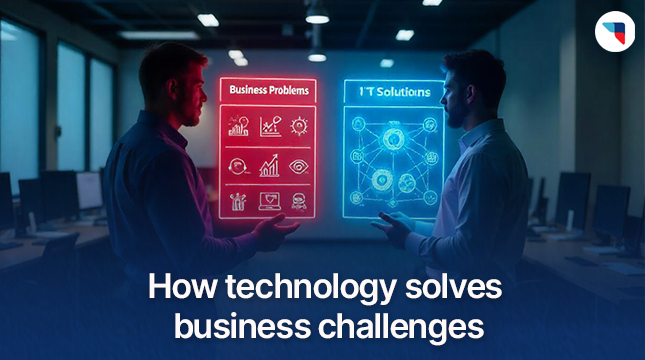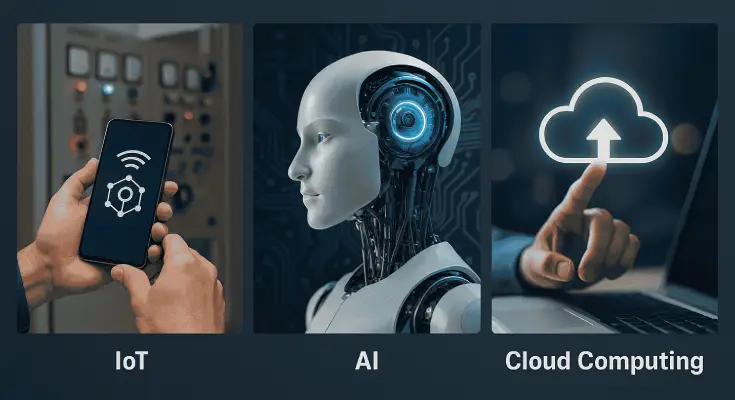This website uses cookies so that we can provide you with the best user experience possible. Cookie information is stored in your browser and performs functions such as recognising you when you return to our website and helping our team to understand which sections of the website you find most interesting and useful.
Como a tecnologia pode resolver desafios empresariais

Throughout the years, technology has become an asset, helping companies achieve success and realize their potential. It helps startups explore business ideas for startup efficiently, eliminating complex challenges and facilitating growth.
This article explores how technology solves business challenges and how custom-built solutions by companies like Netizens Technologies are a sustainable solution.
What Business Challenges Do Companies Face?
Companies operating in the modern market are encountering more challenges than ever. According to a Backlinko survey for business leaders, 35% and 34% of respondents stated digital transformation was the solution to improve customer service and replace legacy IT systems.
However, these two issues aren’t the only challenges digital transformation is creating. Let’s explore the business challenges that hamper business operations in 2025.
1. Data Privacy and Security Risks
Several risks are associated with digital data storage. Instances of data breaches, hacking, and unauthorized access are becoming common. Evading the countless risks helps to keep your company’s reputation and client trust. It’s also necessary to adhere to compliance.
2. Inability to Leverage Data for Insight
Data is information, a valuable asset for businesses. This raw data requires proper processing to yield helpful insights. Enormous amounts of data can become unmanageable and will be valueless without processing.
3. Poor Customer Relationships
Failure to enter and maintain customer orders and interactions affects customer relationship management. Due to this, departments can’t use the data to improve the user and marketing experiences.
4. Lack of Customer Support
Reliance on human customer support may prove insufficient. Customers may not get their ticket addressed quickly enough. The response may be inadequate, creating a slow and repetitive customer support process.
5. Time Wastage Due to Manual Data Processing
The lack of a data entry and storage system can lead to time wastage. Staff will have to commit many hours to manual entry. Unfortunately, manual work lowers productivity, and data can be inaccurate. Also, data may not be easily accessible when needed the most.
6. Low Sales Conversions
Organized and well-utilized data is the core of a successful sales funnel. Without these two, low conversions and reduced leads are expected. It makes collecting actionable data a leading priority for companies.
7. Poor Recruitment & Talent Gaps
Recruitment bottlenecks delay and affect the quantity and quality of output. As companies expand and branch out, they may experience talent gaps. Unavailability of the right talent can lead to poor performance and lower standards.
8. Data Silos Leading to Poor Collaboration
Each department in a company has a preferred system for collecting and storing data. If these systems lack connection, the resultant data silos can impact collaboration. It makes cross-department data harder to access and can make it prone to inaccuracies.
9. Lower Innovation
In changing business verticals, innovation is crucial to succeed and stay successful. Without innovation and organized data to back innovation, businesses will fall behind. Keeping data available to all departments isn’t a selective need; it’s mandatory!
10. Rising Expenses & Inability to Track Costs
When not tracked, expenses can mount, eating into your profits. In uncertain markets with fluctuating prices, ignoring costs can decrease the budget. Tracking costs helps predict excess and surplus of funds, allowing for the rerouting of funds where needed.
How Technology Solves Business Challenges
Technology solves multiple daily business challenges, even the long-term ones. Here’s how.
1. AI & Machine Learning-Based Threat Detection
Using Artificial Intelligence, companies can leverage AI and Machine Learning to detect threats. These technologies identify anomalies in user behavior data, traffic, and data logs. They can analyze large volumes of data to find patterns that most human analysts cannot.
Unlike existing security solutions, AI-based ones are proactive, alerting you to real-time threats.
2. Bulk Data Processing
Applying Big Data, AI, and storage software allows you to transform raw data. With data analytics consulting, business heads can access processed insights that inform strategic decision-making. These technologies collect data from multiple sources, process it, and extract valuable insights that can be harnessed for growth.
3. Leveraging Customer Relationship Management (CRM)
CRM is specialized software made to store every customer interaction for future use and compliance.
These platforms enable the tracking and storing of customer interactions. Interactions the CRM holds are past orders, customer support tickets, and personal details. CRM platforms power departments, allowing service improvement using customer preferences.
4. Chatbots & Third-Party Support Platforms
Chatbots are AI-powered applications that can cater to customer queries 24/7. Such intelligent applications are trained to respond immediately and appropriately to customer queries. Using ChatGPT API integration for business websites and apps, companies can implement AI chatbots that support faster responses and lower the workload for human support agents. This approach can also reduce costs as fewer staff are needed.
5. Automation
Automation involves training specific software to execute repetitive manual tasks. Higher productivity is possible when using this technology, which is revolutionary and helpful.
Implementing automation allows staff to focus their time and effort on high-value projects. According to the Harvard Business Review, 40% of work in the USA can be automated!
6. Predictive Analytics
Getting an understanding of user behavior and market trends helps in scoring leads. With user data, firms tailor marketing campaigns to suit patterns the data reveals.
This predictive data reduces wasted opportunities and ensures that most leads convert.
7. Recruitment Software & AI-Backed Recruitment
Recruiting software for small businesses allows HR staff to track talent and employees efficiently. AI recruitment platforms offer tools to streamline hiring processes. Applicant tracking systems (ATS) track candidate applications and score them through smart scanning, reducing HR workload and improving hiring quality.
8. Harnessing Cloud Solutions
A common issue persisting in most companies is silos. These obstacles prevent data sharing and collaboration.
Employing cloud solutions, companies can bring their data to one place. It facilitates cross-department collaboration, improves workflows, and saves time. Also, it reduces data threats by allowing authorization restrictions and advanced security solutions.
9. Leveraging Emerging Technologies
Companies that are the first to embrace emerging technology, such as Jasper AI and cloud hosting solutions, are more likely to adapt and drive innovation across their operations. Some transformational technologies of the decade are IoT, AI, and edge computing.
They fuel innovation by inspiring new products/services or improving operational workflows. An instance of them in reality is visible in IoT-powered factories. These smart factories use sensors to collect data and predict issues, lowering downtime.
10. Unified Dashboards from Enterprise Resource Planning (ERPs)
ERP software helps enterprises track core operations. Divided into modules, it connects operations into one platform and a unified dashboard.
This dashboard collects and converts business data into brief, insightful content. It also links orders, costs, and production, allowing businesses to track their funds.
How Emerging Technologies Solve Business Challenges?
When looking to adapt to ever-evolving business challenges, an IT partner is crucial!
These experts know these new technologies and help firms use them efficiently. Partnering with proficient IT partners like Netizens Technologies lets businesses master technologies faster for efficient website and mobile application development.
Artificial Intelligence:
The rise of AI has been nothing short of transformational. Today, AI is the foundation for smart assistants, predictive analytics, and automation. AI-enabled chat systems collect data and transfer it in real time.
Internet of Things (IoT):
It creates a system that relies on physical devices to collect and transmit data. Wearable devices are an example of how healthcare providers track heart rate and glucose levels.
Cloud Computing:
These platforms enable business expansion without increasing infrastructure costs. Storing data and applications on the cloud allows easy and remote access. Using custom software development services, companies can develop their own cloud software.
Real-Life Cases: How Companies Use Technology to Solve Business Challenges
Modern technologies are everywhere today, bettering how traditional businesses function. Their adoption has led to cost savings, improved products, and more customized services.
1. Manufacturing Industry
In manufacturing, being able to increase output, decrease wastage, and reduce downtime is necessary. AI, alongside IoT systems, collects data on the production floor and allows for planning.
Specialized robotic equipment and data allow following of protocols to eliminate manual and repetitive tasks. Logistics management software facilitates the convenient and quick transportation of raw materials and finished products.
2. Finance and Banking
Financial Technology (FinTech) solutions have transformed operations in this sector for the better. Automated calculations have improved processing speed and reduced human error.
Digital payment options enable the secure sending and receiving of payments in minutes. The application of Blockchain technology enables safe and transparent handling of transactions and lowers vulnerability to fraud.
3. Education Industry
This sector embraced technology to expand learning to more students and improve outcomes. The rise of online learning platforms shows how VR makes learning faster and enjoyable.
AI helps teachers adapt learning experiences for students. These lessons are tailored to suit the student’s learning style, grade, and curriculum. Schools can use a student management system to empower operations.
4. Healthcare Industry
Technology-based electronic health record (EHR) systems help healthcare providers store patients’ medical data. Such a system allows doctors to view and update patient history instantly.
Also, telemedicine platforms remove physical meetings for diagnosis and medical prescriptions. They make medical treatment accessible and help healthcare businesses overcome business challenges.
5. Retail Industry
Reducing waste reduces losses, and companies can do this by tracking inventory numbers and market demand. AI-powered software and integrated business applications collect data to merge it into a dashboard.
Augmented Reality (AR) lets customers virtually try on clothing items without actually doing it. Self-checkout systems and various payment methods have made shopping faster and convenient.
Conclusion
While some think technology is a burden, others see it as an empowering agent. Emerging technologies have already been proven to improve business operations. The proof is in the number of businesses actively using it. They use it to speed up processes, cut errors, and provide a better customer experience.
At Netizens Technologies, we develop modern technology to solve business challenges. The result is improved profitability, customer loyalty, and greater market share. Partner with us to realize your business’s actual capabilities with web application development that is fully technology-powered.
Perguntas frequentes
1. How do I select the right technology for my business?
Selection will start by understanding their challenges and noting them down. Then assess the available options and their contribution to solving your issues. Perhaps one technology isn’t as effective as merging two technologies.
2. What problems can technology help solve?
Technology helps to solve issues related to errors, excessive manual work, low productivity, and poor customer satisfaction.
3. How are small businesses benefiting from today’s technology?
Small businesses are benefiting from technology in several ways. It helps reduce costs, increase productivity, and improve quality.
4. How does technology impact business strategy?
Given the benefits, technology will influence business strategy in a digital-first world. Companies adjust strategies using technologies that reduce costs, improve operational efficiency, and boost business.
5. How does technology impact your business on a daily basis?
Daily, technology will take over manual tasks, check for errors, and accelerate processes. This alone helps businesses save on expenses and gives them more resources for vital projects.

Let's Start Your Project
Get free consultation for your digital product idea to turn it into reality!
Get Started






